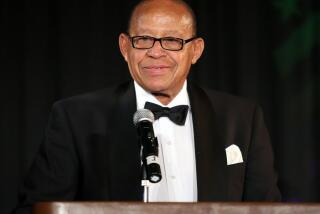Southland Radio Pioneer Carl Haverlin, 86, Dies
- Share via
Carl Haverlin, a veteran radio executive credited with bringing Broadcast Music Inc. into the front ranks of music rights organizations and the man who put both the Rose Bowl game and the Los Angeles Philharmonic on the air, died Monday. He was 86 and died at a Canoga Park hospital.
Haverlin, who began with Broadcast Music Inc. in the 1930s as an $85-a-week field representative, rose through the ranks to become its president, retiring in the mid-1960s.
Promoter of Radio
The organization, said a local spokesman, has more affiliated writers, composers and publishers than the American Society of Composers, Authors and Publishers (ASCAP). During his tenure Haverlin also established a BMI Archives of Music with its collections of scores penned by Puccini, Bizet, Liszt, Mendelssohn and others. The collection includes a first edition of “The Star Spangled Banner.”
But locally he may best be remembered for his contributions to Earle C. Anthony’s old radio station, KFI.
In a 1979 article in Westways Magazine, writer Mort R. Lewis recounted how Haverlin, then in his 20s, was announcing, selling time and promoting the embryonic station. In 1926 NBC decided to make KFI its Los Angeles affiliate; Haverlin, to help establish the station’s credibility, arranged for the first broadcast of a Rose Bowl game.
He and Graham MacNamee shared announcing chores for the Stanford-Alabama game and Haverlin continued to work Rose Bowl games until 1934, two years before his affiliation with KFI ended.
He also persuaded William Andrews Clark, father of the Los Angeles Philharmonic, to broadcast the orchestra’s Thursday night concerts, guaranteeing Clark that if the live programs kept patrons from the concert hall, KFI would pay the Philharmonic $1,000.
At the time, he recalled in the magazine interview, he was making $45 a week and if he hadn’t convinced Standard Oil of California to underwrite that $1,000, he probably would have been fired.
In 1927 he talked the Hollywood Bowl into live broadcasts, announcing the programs himself and conducting interviews with musicologists during intermissions.
Haverlin was taught to read and write by his mother, a former school teacher, and his formal schooling didn’t begin until he was 8 and living in St. Louis.
A Student-Athlete
The family moved to Los Angeles, where he attended Manual Arts High School. He was a student-athlete attracted to dance and toured briefly with the Ruth St. Denis-Ted Shawn troupe before entering broadcasting.
A lifelong bibliophile, he donated many of his books and ancient manuscripts to the library at California State University, Northridge.
A widower, Haverlin is survived by three grandchildren.
More to Read
The biggest entertainment stories
Get our big stories about Hollywood, film, television, music, arts, culture and more right in your inbox as soon as they publish.
You may occasionally receive promotional content from the Los Angeles Times.










